Inside Out: "A Scanner Darkly"
A Scanner Darkly (2006, Dir. Richard Linklater)
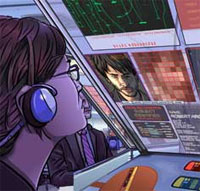 |
-- Philip K. Dick
The late producer Albert R. Broccoli once claimed that the concepts behind the loony James Bond film Moonraker were based "not on science fiction, but science fact." While you're busy rolling your eyes at that statement, consider how it could also apply to the strange career of Philip K. Dick in Hollywood. In Dick's case, his wild musings on society, religion, drugs, and Life-As-We-Will-Know-It usually give way to the cold, hard facts of the modern blockbuster, as the pictures based on his books tip towards man-on-the-run action thriller plots guaranteed to pack the cineplexes. Among this pack of fun but mediocre Dickian entertainments (Total Recall, Minority Report, Paycheck), only one film stands out: Blade Runner (based on Do Androids Dream of Electric Sheep?), which despite its overwrought art-deco aesthetic manages to limn the sadness and dislocation of the source material.
It's not so surprising, really; as the quotation at the top illustrates, Dick was all about retreat -- retreat into drugs, alternate worlds, or realities much like our own, save a simple twist (i.e., what if God decided to actually show up one day?). Even the short stories he fashioned early in his career are what-if scenarios, leavened with gallows humor and a deeply suspicious view of institutions and powers-that-be. In the end, it's not so much whether the hero lives or dies, it's whether he finds the wherewithal to carve out a niche in a society that views him as less than expendable -- hardly the stuff of summertime movie fun.
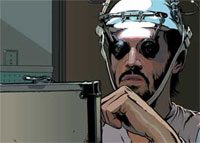 |
The result is a film that is undeniably the most faithful Dick adaptation yet, rendered in the shimmery rotoscope animation that graced Waking Life. The story (and much of the dialogue) is lifted straight from the novel: in the near future, Orange County undercover cop "Fred" (Keanu Reeves) is on the trail of Robert Arctor, a criminal mastermind who deals in the addictive Substance D, which has the unfortunate side effect of splitting people's personalities in two. Fred's investigation leads him to Jim Barris (Robert Downey Jr.) and Ernie Luckman (Woody Harrelson), two frazzled conspiracists who may or may not actually be threats, as well as well as their dealer Donna Hawthorne (Winona Ryder, all too convincing as a strung-out neurotic). Sounds cut-and-dried, except for the fact that Fred, who is hooked on Substance D himself, is actually Robert Arctor, both the surveilant and the object under surveillance. When with the police, Fred (as all undercover cops do) wears a "scramble suit" that camoflauges his appearance under thousands of shifting simulacrums of other people's faces and bodies (the film's most striking visual effect). Thus the conundrum: Who is chasing who? More to the point, who is who? And why?
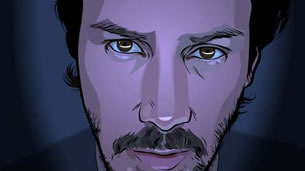
Sounds like a whirlwind of confusion, but Linklater does a yeoman's job of setting up the plot mechanics and then letting the Dickian paranoia take over. Reeves is Reeves: a beautiful blank whose speech rhythms resemble that of a stoner struggling to rouse himself (in other words, perfect for the role). Ironically enough, the veneer of animation grants him a soul. Even as he wrestles with his split brain halves, we catch glimpses of his groggy face behind the scramble suit, and in these moments he seems more alive, more tremulous, than in any previous film. His fractured identity takes the classic Dickian paradigm of resistance to authority to its logical conclusion: You're working for the Man even when you're not working for the Man, because even when you're working against the Man, you're still working for the Man.
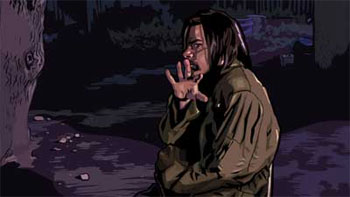
Not only a dystopian view of authority (in a typical Dick twist, the platitude-spouting government agencies and rehabilitation centers that are combatting Substance D may have their own nefarious agendas), A Scanner Darkly is thick with a drug culture survivor's wisdom. At the time Dick wrote his novel, many of his friends had lost their lives to addiction (the moving epitaph to his fallen comrades that closes the book also appears in the movie), and he himself had been permanently debilitated. Familiar with the attractions and repulsions of getting high himself (Dazed and Confused still stands as one of the great stoner movies), Linklater energizes the narrative's pharmacological hallucinations. The opening of the movie plays like Naked Lunch on steroids, as Barris's pal Freck (bloated Rory Cochrane, whose character can be seen as the grown-up Slater from Dazed and Confused, the genial druggie sucked into the abyss) battles imaginary insects that sprout endlessly from his hair.
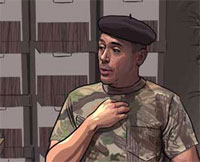 |
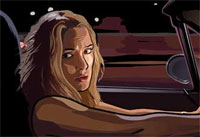 |


0 Comments:
Post a Comment
<< Home